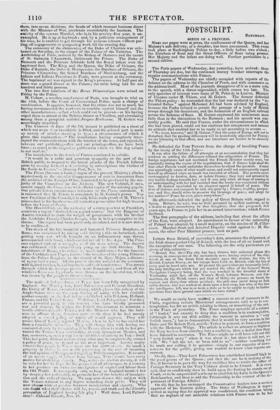The Paris papers of Wednesday, due yesterday, have arrived: those
of Thursday are due, but the continued stormy weather interrupts the regular communications with France.
The papers of Wednesday are chiefly occupied with reports of the debates on the address in the Chamber of Peers, and with comments on the address itself. Most of the journals disapprove of it as a mere echo to the speech, with a threat superadded, which comes too late. The only speeches of interest were those of M. Pelet de la Lortssre, Minister of Finance under M. Tillers, and M. Guizot. The former defended the Thiers policy : he contended that the last war declared by the " in• fatuated Sultan" against Mehemet Ali had been advised by England, because the Pasha refused to permit the passage of a body of British troops through his dominions, and the formation of an English railroad across the Isthmus of Suez. M. Guizot expressed his sentiments more fully than in the discussions in the Bureaux; and his speech was emi- nently pacific. He said that France, under the circumstances in Which she had been placed, could not but continue her armaments and assume an attitude that enabled her to be ready to act according to events - " We trust, however," said M. Cuizot, " that the peace of Europe will not be disturbed, that the pending differences will be honourably adjusted for Prance; we are labouring to that effect, and our intentions arc known to be sincerely pacific."
He defended the Four Powers from the charge of insulting France by the treaty of the 15th July— It was after the failure of till attempts at an accommodation that they bad resolved on settling the differences without the coilperation of France. The foreign negotiators had not cautioned the French Minister merely once, but repeatedly during the course of the negotiations, that if France kept aloof the four other Powers would undertake themselves to adjust the question. France was accordingly aware of what would occur, and could not consequently regard herself as affronted when no insult was intended or offered. The powers never contemplated to deceive, dare, or isolate France; they were not actuated by any hostile feelings towards her ; and it was only when all hope of coming to an understanding with her had vanished that the treaty was concluded without her. M. Guizot concluded by an eloquent appeal in behalf of peace. The time of violence and conquest, be said, was gone by ; France, wealthy, prosper- ous, and free, should strive to preserve the blessings of peace, and adopt for her motto—" Peace for ever, peace everywhere."
He afterwards defended the policy of Great Britain with regard to Spain. Britain, he said, was so little actuated by selfish motives, or by a desire to gain ascendancy in that kingdom, that she proposed, four years ago, to France to join her in an armed intervention; which Fiance declined.
The first paragraphs of the address, including that about the affairs of' the East, were adopted. An amendment in favour of the nationality of Poland was adopted, by a small majority, on the motion of M. d'Har- court. Marshal Soult and Admiral Dnperra voted against it : M. Ha- mann, the other Peer Minister present, took no part.


























 Previous page
Previous page